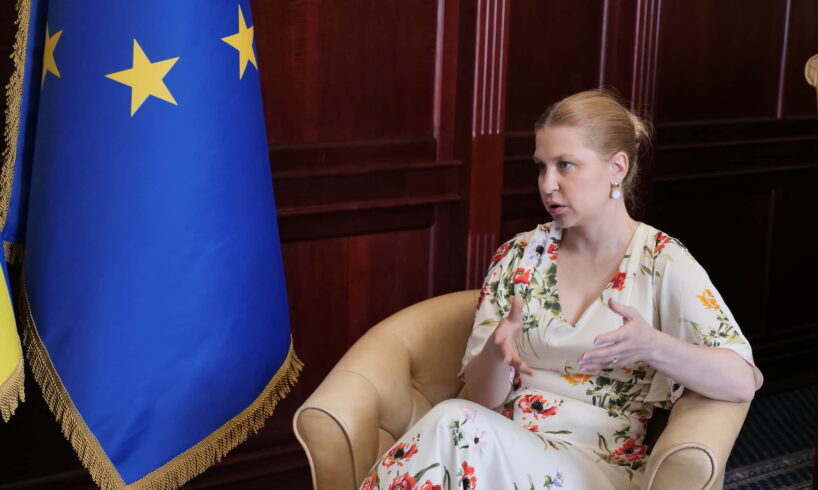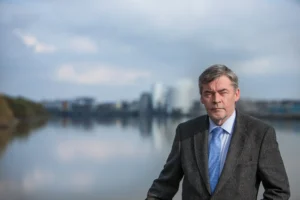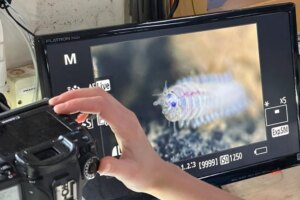
One of the surprises of Ukraine’s July 2025 government reshuffle was the replacement of the deputy prime minister for European and Euro-Atlantic integration.
Olha Stefanishyna was widely seen as having a good personal relationship with the president, and her work on EU matters had received unanimous praise from both experts and other key players in the current administration.
It was even more surprising when President Zelenskyy appointed her to oversee another strategic area: relations with the United States.
This interview with European Pravda is Stefanishyna’s first in her new role. At the start of the conversation, which took place in her government office, she was still acting deputy prime minister, but during the interview the news broke that she had been dismissed and Taras Kachka had been named as her replacement.
Stefanishyna acknowledges that her move to a new position had been planned, but for a later stage. One of the reasons for her early departure, she says, is that the EU is not currently prepared to take the decisions Ukraine expects.
In this interview, Stefanishyna told us about future plans for European integration and about what she has achieved so far.
“There were discussions about whether I should wait before going to the US”
First of all, when did you find out you were leaving your post?
The formal discussion began a few days before the president announced his intention to propose Yulia Svyrydenko as prime minister.
But in reality, these discussions started earlier, when the president told me he was considering me as a candidate for ambassador to the United States.
But wasn’t the initial idea for you to become ambassador to the EU?
No, that was never brought up or considered.
Still, the idea of you stepping down as deputy PM and chief negotiator for EU accession isn’t new. Why now?
I think it happened because European institutions have shown they’re currently not ready to mobilise efforts and make the decision to open the first negotiating cluster. This is despite the fact that the main political work has been done, the institutional framework is in place and the first screening stage went well. All the processes are functioning, but there is no political predictability about when even the first negotiating cluster might be opened.
Two weeks ago, I was with the president in Denmark. Before that, we had meetings in The Hague discussing these steps at length. But we realised that the EU currently lacks political unity on this issue.
That’s why we concluded that at this stage, my work in the US is more necessary for Ukraine.
Let’s return to the EU later, then. The president has appointed you as Special Representative to the US – Ukraine hasn’t had one before. What does the position involve?
The role of presidential envoy isn’t new, although this specific title is. There are several envoys for different issues.
President Zelenskyy was insistent that I begin working in the US immediately. There were discussions about waiting until the first negotiating cluster had been opened, but he insisted I start the new job now. That’s how the idea came about that while we wait for the US to grant agrément and for the appointment procedures to be completed, I’d work in this role.
Can we be certain that the US will approve your candidacy as ambassador?
I need to be cautious in my new capacity, so I’ll say this: all the names that have been discussed in the media, including mine, were shared with the US administration, and there were no objections [regarding Stefanishyna’s candidacy].
So the president decided to support my candidacy.
“Andrii Yermak is the main ‘gatekeeper’ on US matters”
What tasks has Zelenskyy assigned to you for the US portfolio?
The president expects several areas to be strengthened. The first is the implementation of the minerals deal. The second is organising a mechanism for the purchase of US-made weapons.
We have already had a positive signal from the United States in that they are prepared to sell weapons to Ukraine. And other NATO and EU countries have confirmed that they are prepared to mobilise funds to purchase such weapons.
Part of my role will be to ensure that this project is a success. My previous experience will be useful here in establishing cooperation between EU and NATO countries and the United States regarding these purchases – and also to explain to the US what Europe is.
Of course, those aren’t my only tasks. There will certainly be NATO issues, interaction with Congress, and so on.
That all sounds like the role of an ambassador. Will Ukraine have two de facto ambassadors to the US – you and Oksana Markarova?
No. The president has explained that my current role is temporary until the procedures for my appointment as ambassador are completed.
I expect further instructions from the president. I’m also coordinating closely with Andrii Yermak, who is the main gatekeeper in this area…
And now my key task is to consult with the Ukrainian parliament, the new prime minister, the people running various state campaigns and the president’s team so that by the time I leave for the United States, I will have an agenda in place – so that, as they say in Odesa, I have a vision of the first 10-20 steps in Washington.
I’m fortunate that if all goes well, I’ll be succeeding Oksana Markarova, who’s an incredibly effective and well-respected person.
My task is to expand and reinvigorate relations with the US so that Ukraine is heard, seen and known.
You mentioned NATO. Last week, Trump’s envoy Keith Kellogg said Ukraine’s sovereignty is key to peace. And sovereignty includes the freedom to make foreign policy choices. Does this mean the US is beginning to understand that Ukraine’s freedom to choose its security alliances is essential?
Let me put it this way:
You eat an elephant one bite at a time, and you don’t start with the tail.
NATO accession is important and obvious to us, but Washington’s current priorities are cooperation on arms and US participation in ceasefire negotiations.
Our position remains unchanged. And if and when the time comes, we will emphasise that democracy means having the right to freely choose what’s best for your country.
“I don’t believe the Hungary issue was a failure”
How long were you deputy PM for European integration?
Five years and one month.
I can’t even begin to list all the things that have changed.
Because everything’s changed!
At the beginning, we were fighting for our partners to recognise Ukraine’s “European identity”…
And now there’s been a formal decision to start accession talks, but we haven’t actually started. What’s your greatest personal achievement – your political legacy?
I don’t think I can single out one thing.
This has been an enormous personal journey. And I consider it a great honour to have contributed during a full-scale war. I did everything I could, and it’s worked.
Five years ago, I didn’t have a lot of political experience: I had a professional background. I’m proud of having built strong political relationships with parliament, with the president. Five years in government isn’t easy, but I maintained coordination with all the ministers and the prime minister.
This enabled us to secure an irreversible path to NATO membership, to achieve EU candidate status and start the accession process – and to gain parliamentary support for the necessary legislation.
My achievement is the political communications system I built in order to do that – without betraying our course towards European integration, or my principles – and, put it this way, my belief in Ukraine’s future within Europe proved catching among many other members of our team.
I agree – it’s only been in the last year or two that MPs seemed to “catch” that belief. Previously, there was more scepticism than enthusiasm about the EU in Ukraine’s parliament.
I always saw the mono-majority [held by Servant of the People, Zelenskyy’s party] as a window of opportunity. In the previous parliament, the constant arguments used to block even the most basic laws. When Servant of the People came in [in 2019], it included a mix of people from business, civil society, politics, or none of the above. They needed an idea to rally round.
I thought European integration could be that idea.
But yes, things really changed after we applied for EU membership and got support from EU leaders in March 2022. That’s when parliament realised that sometimes nitpicking legal texts didn’t matter.
What did you not manage to achieve?
Of course, there were some things.
Maybe Hungary?
I don’t think the situation with Hungary was a failure.
When we entered the EU’s “stratosphere”, it made everyone realise “Oh, the Ukrainians really are here now.”
That’s when we started getting the harshest blows from our neighbours.
It was a big disappointment and very painful. We’re at war, and then there are these trade disputes.
So not just Hungary – “neighbours” plural?
Yes. But it taught us not to get offended or pick fights with neighbours.
We adopted a policy of “unconditional love”.
Politicians come and go, elections happen, but relationships must endure, no matter what.
With Hungary, I believe we’ve accomplished a lot. The agenda is just a bit different.
Still, the failure to open accession talks must count as one such setback. EU officials continue to say that Ukraine will open all six clusters by the end of the year, and we’d hoped to open the first one this week, but it hasn’t happened.
I don’t agree that this was a failure on my part. We did everything we had to do.
Anyway, until 31 December 2025, it’s premature to say we failed. The clusters could be opened anytime, even all at once.
But I do think it’s unforgivable that EU institutions and member states have failed to find a way to get this decision made.
We heard that the EU was preparing to open the first cluster this week, but didn’t. Is that true?
Yes. That attempt helped cement the president’s decision to nominate me as ambassador to the US.
We worked hard to make the 18 July decision happen – me, Andrii Sybiha and Andrii Yermak. We engaged with EU leaders, the Commission and ministers. We gave it our all. But clearly, some internal EU political element was missing.
That’s why the president decided that my efforts will be better directed towards the US.
Now, further EU negotiations depend on the president communicating with EU leaders, and on diplomatic work. Sybiha will continue to push this forward.
“There is no reason to scale back our ambitions”
You led Ukraine’s EU accession delegation, and now you’re leaving the negotiations. What does this mean?
The negotiation infrastructure is up and running. Each cluster has a dedicated lead negotiator. Even if ministries merge or split, that won’t change.
European integration is now a vast, structured process. I’m confident it will go on working.
Each group includes government officials, experts and MPs. This helps with transparency. Sometimes when officials gloss over issues, MPs or experts raise red flags.
The preparatory work is nearly done. Last week, we finished screening the fourth cluster. Most of the work is done. We just need the Commission’s assessments.
We hear the government is drafting a national programme of alignment with EU law, including deadlines. When should Ukraine be ready to join the EU?
Even now, all the commitments Ukraine has undertaken as part of the negotiation process – without transitional periods – have been limited to the end of 2027. So we have 2025-26 to develop decisions, and 2026-27 to adopt them.
We’ve launched a major EU project called Ukraine2EU, which supports this process. There are experts, a methodological framework, and existing groundwork. And once the European Commission reports are available for each cluster, we’ll be able to approve the programme gradually, cluster by cluster.
When will it be adopted? That depends on internal politics and parliamentary priorities. But I see no reason to scale back these goals or make them less ambitious.
So what are the goals?
To open all the negotiating clusters in 2025, and to complete the legislative amendments so that our laws fully align with EU law by the end of 2027.
Sergiy Sydorenko,
Editor, European Pravda
If you notice an error, select the required text and press Ctrl + Enter to report it to the editors.





